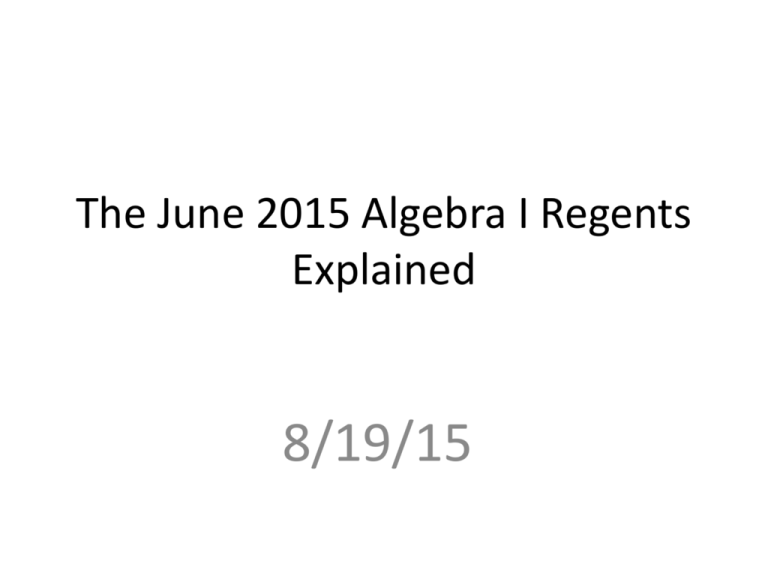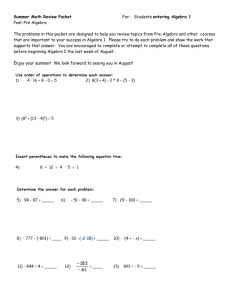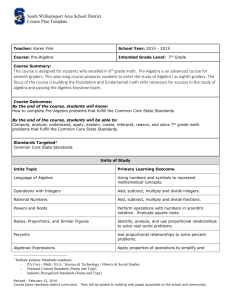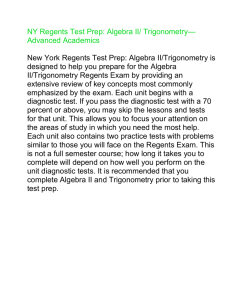The June 2015 Algebra I Regents
advertisement

The June 2015 Algebra I Regents
Explained
8/19/15
A brief history…
• Until January of 2002, Algebra was called
“Sequential Math I” or “Course I”. This was
the last course where the percent you got
correct directly translated to the grade you
received.
• Ex. If you got 75 points, you received a 75% for
the exam
• This was also the last exam to be scored out of
100 points.
• June 2002 introduced the Math A exam, which
was a year an a half long course (we did it in
two years at Norwich) that included Algebra
and some Geometry
• This exam was out of 85 points and introduced
the “conversion chart”, which was essentially a
curve.
• Ex. On the June of 2003 exam, using the
original conversion chart, 51/85 points
translated into a 65. That meant that student
needed to know 60% of the exam to pass.
However…
• On that same June 2003 exam, 63% of
students across the state who took the exam
failed it.
• In response, NYSED changed the conversion
chart. After the change, 51/85 points now
granted a score of 75. The passing score
dropped to 36/85, which means that you only
need to know 42% of the exam to pass.
But this also affected the high end
• Students shooting for “Mastery” (85 or above)
only needed to get 60/85 to get a grade of 85.
But that meant they only need to know 71% of
the exam!
• Essentially, most students basically received
anywhere between 10 and 20 points added on to
their percent correct to determine their final
score (the extreme ends of the chart varied).
• The conversion chart continued to add more and
more points as time went on.
And then it changed again
• Math A ended in January of 2009. The new
course that took its place was called
Integrated Algebra.
• This exam brought the course back to a oneyear class, and kept a similar number of total
points (87) and conversion chart (On June of
2008, 30/87 points got you a 65. That’s only
34% correct!
• Mastery could be achieved with a score of
65/87, which got you an 85 by knowing 75%.
Which brings us to:
• Common Core Algebra I was first given last year
in June of 2014.
• Due to several issues with the rollout of Common
Core, students were allowed to take both the
Common Core Regents and the previous
Integrated Algebra Regents and keep the higher
of the two scores.
• In June of 2015 all NCSD Freshmen (and
advanced 8th graders) could only take the new
Common Core Regents.
So what’s the big deal?
• There are several conditions that combined to
create a disaster for students at Norwich,
including Common Core, Modules, the
Conversion Chart, Pre-Algebra, and staffing
changes.
The Common Core issue
• The level of difficulty for questions on the exams
has increased each time the course changed
name/curriculum, but Common Core was the
biggest jump yet. Take a look at an example from
Integrated algebra (June of 2014)
13
Which relation is a function?
(1)
{(2,1), (3,1), (4,1), (5,1)}
(2)
{(1,2), (1,3), (1,4), (1,5)}
(3)
{(2,3), (3,2), (4,2), (2,4)}
(4)
{(1,6), (2,8), (3,9), (3,12)}
And now compare that to:
Common Core June of 2014:
21 A sunflower is 3 inches tall at week 0 and grows 2 inches
each week. Which function(s) shown below can be used
to determine the height, f(n), of the sunflower in n
weeks?
I. f(n) = 2n + 3
II. f(n) = 2n +3(n - 1)
III. f(n) = f(n - 1) + 2 where f(0) = 3
(1) I and II
(2) III, only
(3) II, only
(4) I and III
Then there were the Modules
• Modules are a set of pre-written lessons,
provided though EngageNY.org, that the NCSD
chose to Adopt as-is. This meant that
teachers had to follow them “to a t”.
However, they were not created by the same
people who write the Regents exams, so they
did not necessarily line up to each other. They
also did not provide for differentiation for
different learning levels.
• Additionally, the modules came out late (so
teachers were learning them literally days before
teaching them) and the times listed that each
lesson was supposed to take were completely
unrealistic.
• Let’s not forget to mention either that students
were expected to have had years of common core
experience going into these lessons, which they
obviously did not.
• There are also no approved textbooks for the
course, so there is limited reference material for
parents to use (if they can even understand how
the material is taught).
Staffing
• In the 13-14 school year when the new CC
Algebra course was first offered none of our
long-term Algebra teachers were left at the
high school. As a result, a brand new teacher
and a veteran teacher (that had not taught
Algebra in quite some time) were left to fill
that gap.
Course Offerings
• A previous administrator, over the objections
of the math department, eliminated the PreAlgebra course that used to be taught at the
high school. It was designed for students that
had typically failed their math state testing in
grades 3-8 and that needed more time with
the basics to be ready for Algebra.
• As a result, all of those students were thrown
into a course where they had no chance for
success.
Compared to other districts
• I spoke with Nan Gizowski at BOCES to see
how many other districts offer a Pre-Algebra
course or a two-year Algebra track. Although
she did not hear back from every district in
the BOCES, she believes that Norwich is
currently the ONLY school that did not offer
one of those two options in the 14-15 school
year.
And that conversion chart…
• Most of you have already seen the letter I sent
home to parents. As a quick comparison to
the previous courses, for the June of 2015
exam a student needed 30/86 to get a 65
(35%). However, at the upper end, a student
needed 75/86 to get an 85 (87%). So now
instead of adding points at the higher end, the
chart actually subtracts points!
Why did it change?
• For whatever reason, the middle of the pack is
now highly clustered up like never before. For
example, getting 40/86 points this year would
grant you a score of 70, but a score of 61/86
would only get you a 75!
• This practically ensures that all but the best
performing students end up in the 70’s, and
lumps them in with students who knew less
than half of the material on the exam!
So why wasn’t this an issue last year?
• It was! You likely didn’t hear about it though
because the majority of our students did
better on the “old style exam” and took that
grade; the results of the common core exam
were widely disregarded due to that fact.
• On average, my advanced students last year
scored 10 points higher on the older
integrated exam than on the common core
exam.
But the worst is yet to come…
• The class of 2022 (this year’s incoming 6th
graders) will need to reach a higher score to
pass the exam.
• If you were to use the June of 2015 exam’s
conversion chart, a student in the class of
2022 would need to score 56/86 points to
pass (which is exactly 65% of the exam).
That’s nearly DOUBLE the score they currently
need to pass.
Worst-case scenario:
• Using the conversion chart numbers for the
class of 2022 and applying them to this year’s
exam, you would see the following:
• This year’s advanced 8th graders would go
from a 100% pass rate to a 68% pass rate
• The high school would only have had TWO
students pass (out of the 155 who took the
exam).
What about other districts?
Here’s a chart comparing BOCES results:
And this uses the 2022 standards:
So what are we doing about it?
• Instructional changes
• Course offerings
• Instructional supports
Instruction
• Modules are no longer being followed as-is.
Appropriate changes and adjustments are
being made.
• Enough Regents exams have now been given
that we can start to get a better feel for what
kinds of questions will potentially show up,
which makes it easier to direct our focus
during instruction.
Course Offerings
• This year we will finally be bringing back the
Pre-Algebra offering.
• We will also be looking into a two-year course
possibility, but that would likely require an
increase in staffing at the high school.
Instructional support
• The newly created “Teacher Leader” positions
will allow for more direct critiquing and
collaboration for direct instruction.
• Remember the Regents results from other
local districts? Those Sidney results were all
from one teacher, and we reached out to that
teacher. He can be found on tonight’s
personnel recommendations!
Questions?




